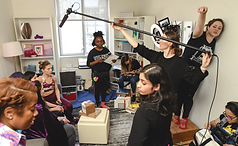
Role and Expectations
A helpful resource to ensure that everyone is on the same page.


Roles & Expectations
One of the unique aspects of the Women's Weekend Film Challenge is that when you get accepted, we place you on a crew with strangers; you'll instantly expand your professional network for referrals and hires. We also provide complete equipment packages so that you can do the best job possible.
When you apply for the challenge you're asked to rank your top three choices for a role you can fulfill on the team. The role descriptions below are meant to help you decide if you're qualified to fill a particular role and to ensure that everyone understands what is expected of them. Due to the demanding timeline and limited funds of the challenge, the roles might be slightly different than what you've experienced on past sets. Please read through the descriptions to make sure you know what you're signing up for.








